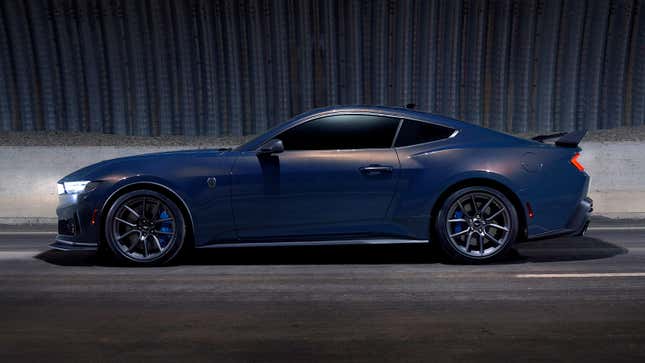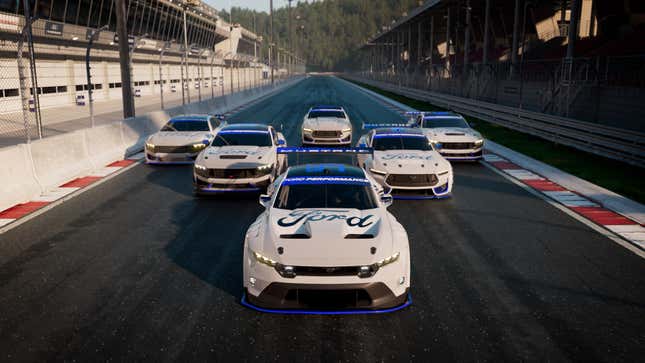Ford is going all in on motorsport with the seventh-generation 2024 Mustang, pledging the new pony car to a variety of racing series. That commitment is reflected in the Mustang Dark Horse S and Dark Horse R — two track-only coupes built atop the street-legal Dark Horse, the most powerful version of the latest ’Stang.
We’ll start with the Dark Horse S, which, according to Ford, was designed with the “weekend track-day enthusiast” in mind. Everything irrelevant to racing has been stripped from this model, which gets an FIA-certified roll cage, safety nets, racing seats and belts and a pro-grade quick-release steering wheel. In fact, the passenger seat is optional.
Performance enhancements include upgraded exhaust and brake systems, as well as Multimatic dampers with adjustable ride height and camber.
The dashboard has been redesigned for track use, with physical switches and knobs for functions like the headlights, windshield wipers, side mirrors and rain light, all housed in a central panel for easy access. You’ll just have to imagine all of that, as Ford has not yet provided images of the interior.

Ford even threw in a pit-lane speed limiter, so the automaker certainly knows this car’s audience. Outside, an adjustable rear wing and tow hooks are functional touches that also convey the Dark Horse S’s purpose.
The Dark Horse R touts all of those improvements as well, but is built to be even more robust for professional-level competition. Strategic seam welding, a long-range fuel cell and exclusive Ford Performance rims accompany a “special serialization” that the automaker says approves the Dark Horse R for racing.
Ford hasn’t released many images of the Mustang racing variants, but we can see the Dark Horse R in this family render. The interesting thing is, it looks very similar to the GT4-spec car.

At the front in this image is the top-dog GT3 chassis that will contend the IMSA WeatherTech Championship in 2024 and the 24 Hours of Le Mans. Then, either the Dark Horse R or GT4 model appears behind it to the left, flanked by the Mustang destined for Australia’s Supercars series. A similar-looking machine can be seen on the back right as well — the only obvious difference being the size and shape of the rear wing.
It’s encouraging to see Ford truly stake the Mustang’s claim to racing, from the grassroots level to the pinnacle of global competition. It’s the sort of validation the Mustang always deserved but rarely received, being sidelined for sporting purposes in favor of the Ford GT. For the seventh-gen, the Mustang is scalable. If you track or race at any level, there will be one for you.